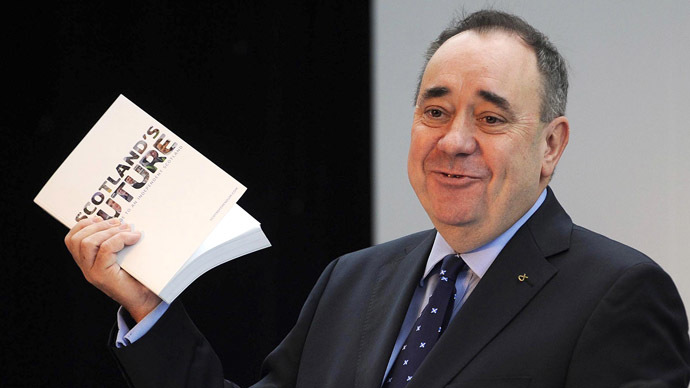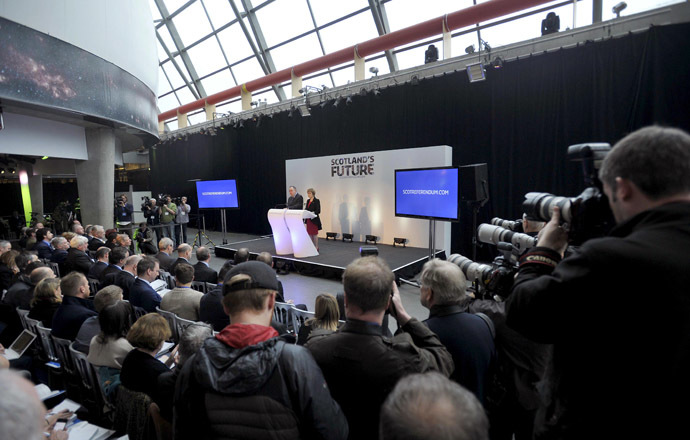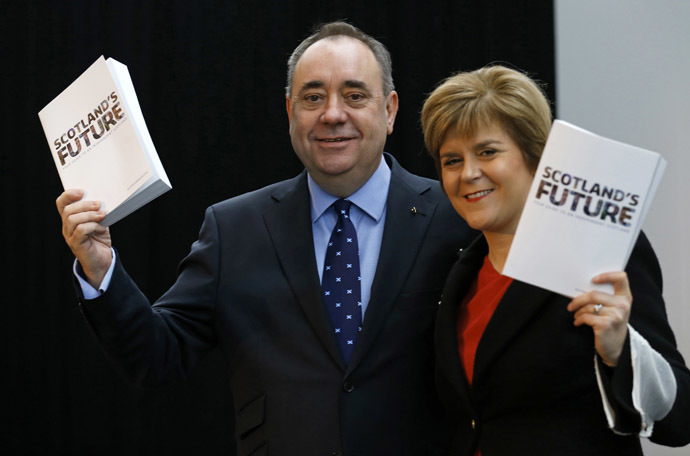Independent Scotland ‘far more able to realize society it wants’

Scotland is far more able to realize the sort of society that they want, free of nuclear weapons and bedroom tax, than they will ever manage under Westminster, Jonathan Shafi, Scottish independence campaigner in Glasgow, told RT.
RT:Isn't this really just a sales manifesto - how are Scots supposed to make a qualified decision when there's a crowd-pleasing wish list about tax, jobs and welfare - but not a great deal about how they're going to pay for it?
Jonathan Shafi: It's 650 pages attempting to answer 650 questions. As it was announced this morning this is one of the most, if not the most in-depth plan that has been provided to the people of any country seeking independence. That’s a good starting point. But for me, some of the main headlines are just how different the Scottish government approaches the key economic concerns in comparison to Westminster. For example, there is a commitment to keep public services, to nationalize Royal Mail, to keep the ENI shares in public hands, to scrap the bedroom tax. Also we are getting some idea about timing when we'll get rid of trade of nuclear weapons and redirect this money into social services. Given the length of the document, there is a lot to digest, but I think those are some of the key talking points, of course as well as the idea of having free child care.
RT:How can the blueprint help people make their choice on the issue of independence when so much still has to be decided and negotiated?
JS: I suppose the discussion so far has been one in which what we’ve seen from the No Campaign has been nothing concerning how they would improve the lives of people. We have seen no idea of how they would, for example, start to think how to raise living standards… redistribute wealth. In fact what we’ve seen is the opposite of that. We’ve seen them put forward ideas that are going to maximize the welfare of the very top of society. What I've got to say is that this is a start of the broader discussion about what sort of Scotland we want to live in. On Saturday there were over a thousand people attending the radical independence conference, most put forward a radical version of how we want to shape Scotland. There is a diversity of views about what our country should look like. But we all be united and say that we are saved by the people of Scotland and not by a Tory millionaire cabinet in Westminster, completely disconnected from people's lives.

RT:The white paper's critics say it doesn't set out any Plan B for the Scottish government. Surely it needs one...
JS: What’s the Plan B for Britain? I mean look at this situation that we are currently finding ourselves in. For example, if you look at something like bedroom tax, where people are facing eviction from their own homes, they are asking where is the Plan B from Westminster. The people who are currently protesting against nuclear weapons, they are also saying where is the Plan B to get rid of these weapons. I think a lot of the answers are actually contained already in the process taking place under referendum. You can’t give the answers to every single question about how the society will be run, but you can have quite a good idea of what you want to see as your priorities. The priorities which the independence movements are bringing forward - things like democracy, equality - we want to start thinking about our economy, whether there can be a democratic participation ivolved in our national resources, nationalization of key industries, though not all this is contained in the White Paper, not all of this is contained in the Scottish government’s plan. This is not just about the Scottish government, this is about the hopes and dreams of the Scottish people.
RT:The pro-UK campaign says the SNP plans to change anything unpopular and keep what's popular as it is. How is it possible to keep the benefits of staying in Britain while being outside it?
JS: I think that’s probably true. I mean if you think about the alternative which would be, let’s say a 30-page document, the criticism would be that it’s too short. The key point about this is that this is the start of a serious debate about what society we want, and it's not going to be based solely on the White Paper. There is a whole range of opinions about what society should look like. This is something that is going to extend beyond the media. Not just to be in the debating studio, but actually to be taken directly to the people’s communities. That’s certainly what we are hoping to do in the next couple of months. We want to hold forums, debates, public meetings, so people can actually begin not only to have a discussion about that, but actually become involved in the process of changing the country. But I think yes, it’s a long document and in some ways it had to be a long document, but the overriding message that has to come through today is that we need to have some level of agreement. Here is an ambition for something far more progressive than the mainstream and Westminster is currently giving, and far more progressive than anything that Westminster will be able to do over the coming years.

RT:Keeping the pound would need agreement from London. Is that likely? What's more, if Scotland uses a London-controlled currency, it's not really an independent nation is it? (It can't set interest rates, monetary policy etc).
JS: We'll still have the possibility of a whole series of measures to ensure that we can control our economic policy. Personally, I favor a Scottish pound because it gives us complete control and therefore allows as to start putting forward and put into practice the serious and radical, progressive changes that we want to see. There's a whole range of opinions in the independence movement about a range of issues, but the one thing that unites us is that we are far more able to realize the sort of society that we want to see, (that's free of nuclear weapons, free of bedroom tax, that defends the welfare state), than we are ever going to be able to see under Westminster.
One thing that we want to do is that we want to have cooperation
with other countries. We want to see cooperation based on
something far deeper to what we currently have. For example, we
want to see a situation when countries trade with each other on
an equitable basis. It is something which involves ourselves in
Europe, but what is done on the basis that saves the working
people, the mass of people, and not just the 1 percent at the top
of society. I don't think that exists currently in the EU, but
the question is can Scotland begin change in that direction.
Scotland wants to play a uniquely progressive role, one based on
social justice and the interest of the mass of people and not the
millionaires at the top of society.
The statements, views and opinions expressed in this column are solely those of the author and do not necessarily represent those of RT.
The statements, views and opinions expressed in this column are solely those of the author and do not necessarily represent those of RT.












